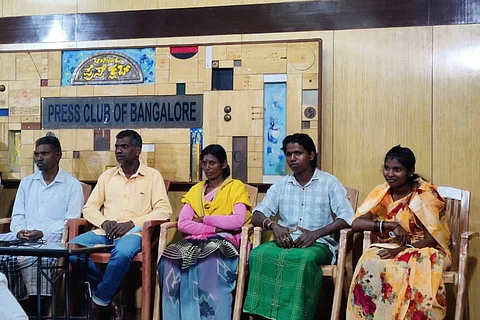

“We are where the forest is, forest is where we are,” says Shiva, a youth leader of Nagarhole’s Jenu Kuruba tribe, while addressing a press conference in Bengaluru on Tuesday, August 9, International Day of World’s Indigenous People. Shiva is one among the five authors of the illustrated book ‘Who are the Jenu Kuruba’, which aims to raise awareness on the injustice meted out to the honey-gathering tribe that has historically been victim to forced evictions, threats, and harassment from the Forest Department and other conservation organisations in the state. The other co-authors of the book — Thimma, Thimmappa, Sommayya and Shanti — are also members of the tribe.
“There are around 5,000 families belonging to the Jenu Kuruba tribe here, and most of them have been forcibly evicted from their houses and shifted to rehabilitation centres,” says Shiva. Recalling the time when his tribal community along with Adivasi people of Nagarhole stopped the Taj Group from building a resort on the forest land in 1985, he says, “Before India gained Independence in 1947, we were the victims of colonial conservation. Now, we still live in fear of forest officials and the government. From being forcibly evicted from our houses to living through several false promises of compensation, we have seen it all.”
Accusing the government of running a business in the name of conservation, Shiva says that the state is promoting the displacement of tribal communities and not their development. “The forest officials either fire shots at us or frame us in various cases. It is them we fear, not animals,” he says.
In December last year, Basava, a member of the Jenu Kuruba tribe, was shot by forest officials who claimed that he was part of a group stealing sandalwood, and that the shot was fired in self-defence. Basava, who sustained injuries on his left buttock and left hand, however, asserts that the officials had shot him because they had a grudge against him.
Chowdamma, a Jenu Kuruba woman who was evicted from her home in 2010, is now trying to return to her village in the forest. “My family was given Rs 10 lakh as compensation, which we used to buy some land and build a house. But later, after habituating away from the forest, my health started to deteriorate. I never understood the concept of paying money for leaves and vegetables. Despite paying for the food, the vegetables didn't provide us with nutrients like the ones we found in the forest,” she says.
Chowdamma is not even allowed to visit the forest to worship their deities anymore, she says. “We have been deprived of our right to worship. We were also lied to during the time of our relocation. We were not informed that we had a right to live in the forest,” she says. Now, after 12 years, their houses are leaking and dilapidated, and the lands they have been given remain uncultivable, she adds.
What the people of the tribe want now is community recognition, habitat rights, and a complete halt on any further attempts to evict them from the forests — a demand that assumes even more gravity considering the Union government’s recent attempts to weaken indigenous rights on forests through the recently passed Forest (Conservation) Rules (FCR) 2022. The government notified the FCR 2022 on June 28, replacing the previous Rules of 2003 and subsequent Amendments, essentially negating tribal forest rights. It may be noted that the new rules are also in direct violation of the Forest Rights Act (FRA) of 2006 and the Panchayats Extension to Scheduled Areas (PESA) Act of 1996.
The book ‘Who are the Jenu Kuruba’ is illustrated by indigenous illustrator Neha Alice Kerakatta, and collated and translated by Sanjana Acharya.